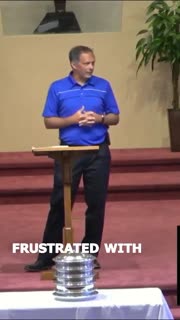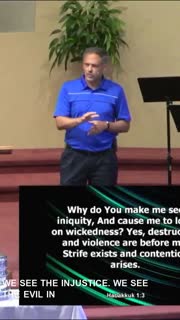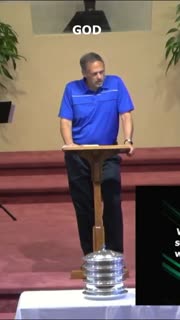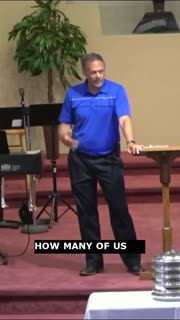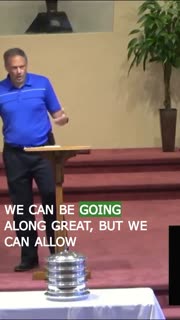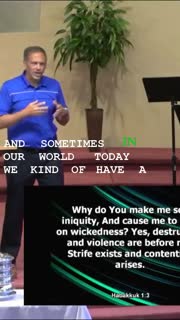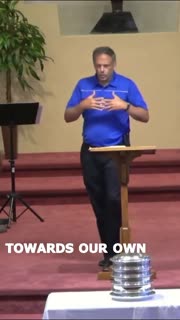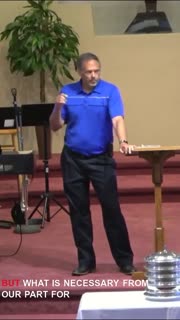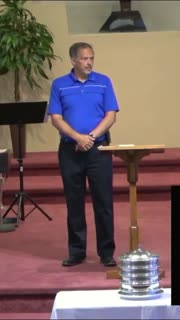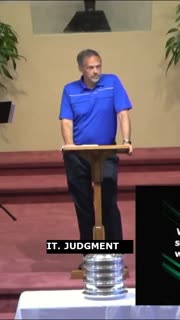Returning to God: Lessons from Habakkuk's Lament
Devotional
Sermon Summary
Bible Study Guide
Sermon Clips
### Quotes for outreach
1. "Does anyone ever get frustrated with the way that life is, that it's not fair? We have that feeling sometimes. And that's what he's going to talk about more as we walk through this text. He already starts about it basically there at the second half, basically with the second verse. He goes, how long am I going to cry out for help? Well, and you're not going to listen. I'm going to cry out violence, and you're not going to save. You know, why do you see all this stuff going on, all this evil, this iniquity, all these things, and yet you ignore it? God, what is going on? Why aren't you doing something about it?" [21:11] (29 seconds)
2. "We see the injustice. We see the evil in our world. And we're like, God, when are you going to step in and intervene? We feel that way sometimes. And that's much of what Habakkuk is telling the people, what he's expressing from his spirit, that's what's going on. I'm frustrated, God. I want to see you move. I know we haven't been perfect, but, God, I want to see your hand." [21:46] (22 seconds)
3. "God is doing something and ready to do something incredible in the lives and hearts of his people if we are willing to turn from our sin and turn back to him. That's what repentance means. It doesn't mean I cry. It doesn't mean I weep. It doesn't mean I say I'm sorry. It means I turn." [42:13] (18 seconds)
4. "How many of us would like to see God move in the church of Jesus Christ? I think we'd like that. But what is necessary from our part for that to happen? What do you and I have to do for that to take place? How do we prepare the grounds of our spirit, of our hearts, to make ourselves open and willing to allow God to move?" [24:54] (22 seconds)
5. "We can be going along great, but we can allow ourselves to get distracted, and we can begin to drift away from where God wants us to. It's a very subtle thing. It doesn't happen overtly. It doesn't happen, you know, like, oh, here it is. The enemy doesn't just come and say, I'm going to change you. We subtly drift away from the standards that matter to us." [23:33] (17 seconds)
### Quotes for members
1. "And sometimes in our world today we kind of have a similar struggle. We see the injustice. We see the evil in our world. And we're like, God, when are you going to step in and intervene? We feel that way sometimes. And that's much of what Habakkuk is telling the people, what he's expressing from his spirit, that's what's going on. I'm frustrated, God. I want to see you move. I know we haven't been perfect, but, God, I want to see your hand." [21:46] (25 seconds)
2. "We have drifted towards our own standards, our own principles, towards things that do not fit with what God has called us to do. And that's a struggle for all of us in our lives, isn't it? We can be going along great, but we can allow ourselves to get distracted, and we can begin to drift away from where God wants us to. It's a very subtle thing. It doesn't happen overtly. It doesn't happen, you know, like, oh, here it is. The enemy doesn't just come and say, I'm going to change you. We subtly drift away from the standards that matter to us." [23:33] (27 seconds)
3. "But what is necessary from our part for that to happen? What do you and I have to do for that to take place? How do we prepare the grounds of our spirit, of our hearts, to make ourselves open and willing to allow God to move? Because one of the dangers that we all struggle with, one of the greatest weaknesses that we have as human beings, are two things I think that really I see again and again in my own walk rise up. There's this need for comfort and this need for self-preservation." [24:54] (35 seconds)
4. "We can keep going that path and say, well, I've always done this. This is the way it works for me. It's scary. I can't do it, but I've got to turn around. And maybe that's the time for all of us to think about in our own hearts and lives today. Is it time for us to turn our hearts and our lives back to Him so that He can do in and through us what He wants to do? What He wants to do in and through us so that we can have the relationship with Him that He desires to have with us?" [43:47] (27 seconds)
5. "Judgment will come unless we repent. That's our only hope as a nation, isn't it? That's our only hope as a church. And I say that not to say that we need to see sacrifice, cloth and ashes in D.C. That would shock us, wouldn't it? I say that because we need to see that at South End Baptist Church. We need to turn our hearts and our minds back to Him and allow Him to do what He wants to do in us." [44:21] (31 seconds)
Ask a question about this sermon
1. "Does anyone ever get frustrated with the way that life is, that it's not fair? We have that feeling sometimes. And that's what he's going to talk about more as we walk through this text. He already starts about it basically there at the second half, basically with the second verse. He goes, how long am I going to cry out for help? Well, and you're not going to listen. I'm going to cry out violence, and you're not going to save. You know, why do you see all this stuff going on, all this evil, this iniquity, all these things, and yet you ignore it? God, what is going on? Why aren't you doing something about it?" [21:11] (29 seconds)
2. "We see the injustice. We see the evil in our world. And we're like, God, when are you going to step in and intervene? We feel that way sometimes. And that's much of what Habakkuk is telling the people, what he's expressing from his spirit, that's what's going on. I'm frustrated, God. I want to see you move. I know we haven't been perfect, but, God, I want to see your hand." [21:46] (22 seconds)
3. "God is doing something and ready to do something incredible in the lives and hearts of his people if we are willing to turn from our sin and turn back to him. That's what repentance means. It doesn't mean I cry. It doesn't mean I weep. It doesn't mean I say I'm sorry. It means I turn." [42:13] (18 seconds)
4. "How many of us would like to see God move in the church of Jesus Christ? I think we'd like that. But what is necessary from our part for that to happen? What do you and I have to do for that to take place? How do we prepare the grounds of our spirit, of our hearts, to make ourselves open and willing to allow God to move?" [24:54] (22 seconds)
5. "We can be going along great, but we can allow ourselves to get distracted, and we can begin to drift away from where God wants us to. It's a very subtle thing. It doesn't happen overtly. It doesn't happen, you know, like, oh, here it is. The enemy doesn't just come and say, I'm going to change you. We subtly drift away from the standards that matter to us." [23:33] (17 seconds)
### Quotes for members
1. "And sometimes in our world today we kind of have a similar struggle. We see the injustice. We see the evil in our world. And we're like, God, when are you going to step in and intervene? We feel that way sometimes. And that's much of what Habakkuk is telling the people, what he's expressing from his spirit, that's what's going on. I'm frustrated, God. I want to see you move. I know we haven't been perfect, but, God, I want to see your hand." [21:46] (25 seconds)
2. "We have drifted towards our own standards, our own principles, towards things that do not fit with what God has called us to do. And that's a struggle for all of us in our lives, isn't it? We can be going along great, but we can allow ourselves to get distracted, and we can begin to drift away from where God wants us to. It's a very subtle thing. It doesn't happen overtly. It doesn't happen, you know, like, oh, here it is. The enemy doesn't just come and say, I'm going to change you. We subtly drift away from the standards that matter to us." [23:33] (27 seconds)
3. "But what is necessary from our part for that to happen? What do you and I have to do for that to take place? How do we prepare the grounds of our spirit, of our hearts, to make ourselves open and willing to allow God to move? Because one of the dangers that we all struggle with, one of the greatest weaknesses that we have as human beings, are two things I think that really I see again and again in my own walk rise up. There's this need for comfort and this need for self-preservation." [24:54] (35 seconds)
4. "We can keep going that path and say, well, I've always done this. This is the way it works for me. It's scary. I can't do it, but I've got to turn around. And maybe that's the time for all of us to think about in our own hearts and lives today. Is it time for us to turn our hearts and our lives back to Him so that He can do in and through us what He wants to do? What He wants to do in and through us so that we can have the relationship with Him that He desires to have with us?" [43:47] (27 seconds)
5. "Judgment will come unless we repent. That's our only hope as a nation, isn't it? That's our only hope as a church. And I say that not to say that we need to see sacrifice, cloth and ashes in D.C. That would shock us, wouldn't it? I say that because we need to see that at South End Baptist Church. We need to turn our hearts and our minds back to Him and allow Him to do what He wants to do in us." [44:21] (31 seconds)
